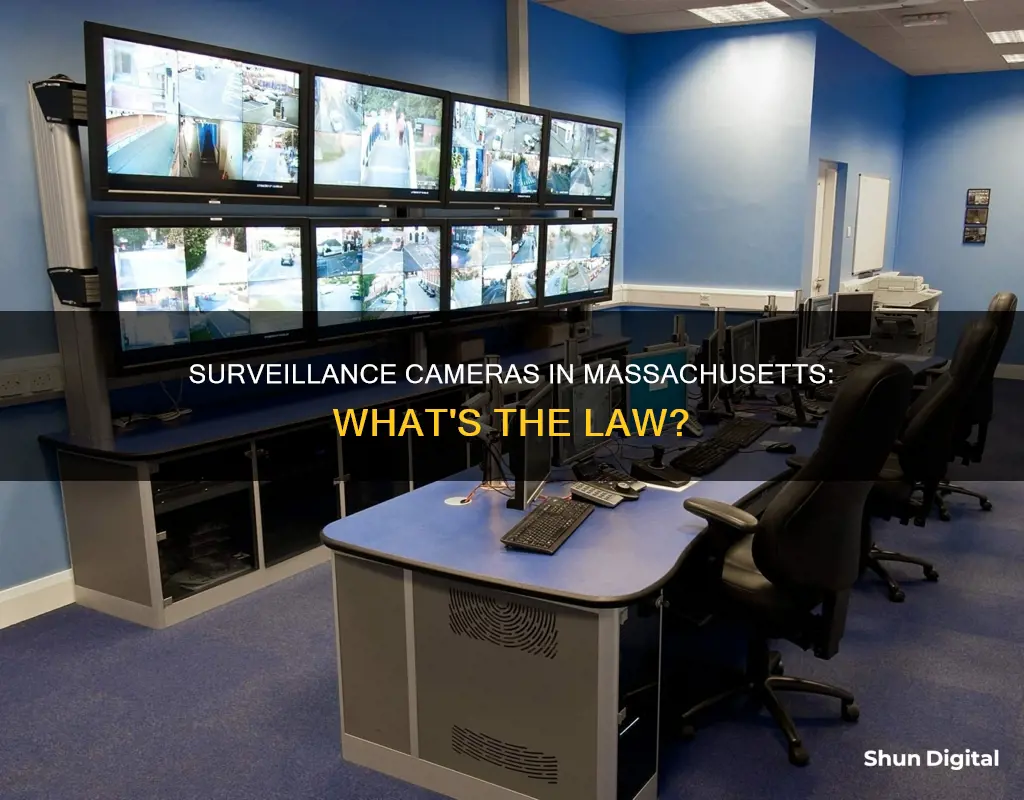
The use of surveillance cameras is a contentious issue in Massachusetts, with no explicit laws regulating their use. However, the state's privacy laws govern the use of these devices, particularly concerning recording people without their consent. While it is legal to install a hidden camera, there are associated legal risks. Massachusetts is an “all-party” state, meaning that under the law, a person cannot record any oral, telephone, or wire communication without the consent of all parties involved. Violation of this law can result in felony charges, including jail time, fines, and civil damages. Additionally, it is important to respect the reasonable expectation of privacy in certain places, such as private homes, bathrooms, and changing rooms.
| Characteristics | Values |
|---|---|
| Legality of surveillance cameras in Massachusetts | No laws explicitly regulating the use of security cameras, but privacy laws that include the functions of surveillance cameras exist |
| Privacy laws | Citizens have rights to privacy in their homes and a right to know when they are under surveillance |
| Installation of surveillance cameras by landlords | Legal, but cameras should not be placed in areas with a reasonable expectation of privacy, such as bedrooms and bathrooms |
| Visibility of cameras | Cameras should be visible, and tenants must be informed about their presence through signs or stickers near each camera |
| Audio recording | Massachusetts is a two-party consent state, requiring the consent of all parties before recording |
| Video recording | A notice or sign in common areas is sufficient to inform people that they are being recorded |
| Penalties for unlawful videotaping | Imprisonment of up to 2.5 years, a fine of up to $5,000, or both. More serious infractions can lead to up to 10 years in prison and a fine of up to $10,000 |
What You'll Learn

Surveillance cameras in workplaces
Surveillance cameras in the workplace are commonplace, especially in financial institutions and retail stores, where inventory and cash are involved. They are also used in workplaces to prevent theft, monitor employee performance, and ensure safety. While the use of surveillance cameras can be beneficial, it is important to consider the legal implications and privacy concerns of employees.
In Massachusetts, there are no laws explicitly regulating the use of security cameras. However, privacy laws govern the functions of surveillance cameras, and both residents and businesses have privacy rights. The state's privacy laws include the right to know when one is under surveillance and the right to privacy in one's home.
When installing surveillance cameras in the workplace, employers must consider the following guidelines to balance their security needs with their employees' privacy rights:
- Determine legitimate reasons for surveillance, such as health, safety, theft prevention, workplace productivity, or security.
- Avoid placing cameras in areas where there is a reasonable expectation of privacy, such as bathrooms, locker rooms, or break rooms.
- Make sure cameras are visible and inform employees about their presence with clear and explicit signs.
- Notify employees about video storage and reviewing policies, and obtain their consent for audio recording if required by state law.
- Adopt a written policy reserving the right to monitor the workplace with visible and hidden cameras, especially if there are reasonable suspicions of health, safety, or company policy violations.
- Have meetings with employees to address concerns and discuss which areas of the workplace should not be considered private.
It is worth noting that unlawful videotaping in Massachusetts can result in imprisonment, fines, or both. Therefore, it is crucial for employers to understand the state's privacy laws and employees' rights before installing surveillance cameras in the workplace.
Using Bridge and Camera Raw Together: A Guide
You may want to see also

Surveillance cameras in rental properties
While Massachusetts has no laws explicitly regulating the use of security cameras, the state does have privacy laws that govern the functions of surveillance cameras, such as recording people.
Landlords and property owners have legal rights to install surveillance cameras to help protect their rental properties. However, citizens of the United States, including tenants, have rights to privacy in their homes and a right to know when they are under surveillance.
Where can surveillance cameras be installed?
Surveillance cameras cannot be installed anywhere inside a tenant's residence or any shared areas where a certain amount of privacy might be expected, like outdoor community bathrooms, changing rooms near the pool, or laundry rooms. Cameras installed outside of the property are generally allowed, as long as they are not pointing at any windows. Cameras can also be installed outside of a front or back door, but if the camera angle allows a full view of the inside of the residence when the door opens, it violates the tenant's right to privacy.
Cameras should be visible and tenants must be informed of their presence. A sign or sticker near each camera is sufficient, but a note or verbal notice is even better.
Legal considerations
Many state and local governments have additional laws regarding the use of security cameras, so it is important to understand what is permitted on your property before installing cameras. Failing to follow the laws surrounding camera usage could result in legal trouble, serious fines, or even jail time.
Cameras with audio capabilities are subject to stricter state audio recording laws and federal wiretapping laws. Massachusetts, for example, has a "'two-party consent' law that requires the consent of both parties to record a conversation legally". If you have cameras that record audio and video, it is crucial to let the people being recorded know that they are being recorded, or the audio should be turned off.
All images, video, and audio captured on a surveillance camera can only be used for safety monitoring—not for spying on tenants. Footage cannot be used to monitor what tenants are doing, whether they are breaking the lease, or any other personal details. Using security footage to collect information about tenants and their personal lives is illegal and considered harassment.
The Biggest Pinhole Camera Project: A Building's Story
You may want to see also

Surveillance cameras in private homes
Surveillance cameras are an increasingly popular way to protect private homes. In Massachusetts, there are no laws explicitly regulating the use of security cameras, but privacy laws must be considered when installing them.
Homeowners and landlords have the legal right to install surveillance cameras to protect their properties. However, citizens also have the right to privacy in their homes and the right to know when they are under surveillance. This includes inside rental units. Landlords cannot place surveillance cameras inside a rental unit's living or private areas, such as bedrooms and bathrooms.
Any cameras installed should be visible, and it is advisable to inform tenants or guests of their presence. A sign or sticker near each camera is usually sufficient, but a note or verbal notification is even better.
Massachusetts has a two-party consent law, which means that all parties must consent to being recorded. This is in contrast to most states, where only one party needs to be aware of audio recording. For video recording, a notice or sign in common areas is enough to inform people that they are being recorded. However, for audio recording, you must obtain consent from all parties. This is because sound can travel around corners and be picked up by the camera, even if a disclosure sign is not visible. Therefore, most landlords choose to install security cameras with the audio turned off and a clear sign indicating the camera's presence.
To ensure legal compliance when installing cameras, it is recommended to consult an attorney familiar with the state's privacy laws.
Fight Camera Tickets: Florida Drivers' Guide
You may want to see also

Surveillance cameras in public spaces
Surveillance cameras are an increasingly common feature of public spaces, with their use by law enforcement agencies, commercial entities, and governments on the rise. While these cameras can be a useful tool for deterring and investigating criminal activity, their presence in public spaces raises several legal and ethical considerations, particularly around privacy rights.
Legality of Surveillance Cameras in Massachusetts
In Massachusetts, there are no laws explicitly regulating the use of surveillance cameras. However, the state has privacy laws that pertain to the use of these devices, particularly concerning recording people without their consent. Massachusetts is what is known as an "all-party" state, which means that under the Massachusetts Wiretapping Statute (G. L. c. 272 s 99), a person cannot record any oral, telephone, or wire communication without the consent of all parties involved. Violating this law can result in felony charges, including jail time, fines, and civil damages.
Placement of Surveillance Cameras
The placement of surveillance cameras is an important consideration. In public spaces, cameras should generally be placed in areas where there is no reasonable expectation of privacy. For example, cameras can be directed at public areas such as driveways, front porches, or backyards. However, it is illegal to place cameras in areas such as bathrooms, bedrooms, locker rooms, or changing rooms, where individuals have a reasonable expectation of privacy.
Notification and Consent
When installing surveillance cameras in public spaces, proper notification and consent are crucial. Visible cameras should be used, and clear and explicit signs should inform individuals that they are under surveillance. If audio recording is taking place, all recorded parties must consent, and this consent should be obtained explicitly.
Benefits of Surveillance Cameras
Surveillance cameras can provide several benefits in public spaces. They can help deter criminal activity, monitor ongoing events, protect individuals and property, and collect evidence for investigations. Additionally, the presence of cameras can provide a sense of comfort and security for the public.
Drawbacks and Considerations
While surveillance cameras offer these advantages, there are also potential drawbacks and ethical considerations. The use of cameras in public spaces can raise concerns about privacy and the potential for government overreach. Additionally, the storage and security of recorded data are important considerations, as unauthorized access or misuse of this data can have severe consequences.
In conclusion, while surveillance cameras in public spaces can offer benefits, it is crucial to balance these against the privacy rights of individuals and ensure that their use is regulated and compliant with the law. Massachusetts residents have a right to privacy, and the state's laws reflect this by requiring consent for certain types of recording. By following these laws and considering the placement and notification of cameras, the benefits of surveillance can be utilized while respecting the privacy of citizens.
Mastering Batch Editing in Camera Raw: A Step-by-Step Guide
You may want to see also

Legal and privacy issues of surveillance cameras
Massachusetts has laws in place to protect the security and privacy of its citizens. While the state's legal code does not specifically address security cameras, they may be subject to the state's privacy laws and regulations. Video surveillance is generally allowed in public spaces without the consent or knowledge of those being recorded. However, capturing audio recordings is subject to the state's two-party consent law, which requires the consent of all parties involved in the conversation.
Two-Party Consent Law in Massachusetts
In Massachusetts, two-party consent, also known as all-party consent, means that all parties involved in a conversation must give permission for an audio recording of the conversation. This is mandated by Mass. Gen. Laws ch. 272, § 99, also known as the wiretap law. If you wish to record audio with your security camera, you need to obtain consent from everyone who might be recorded.
Video Voyeurism Law in Massachusetts
Video voyeurism is a criminal offense in Massachusetts, as per Mass. Gen. Laws ch. 272, § 105. This legislation prohibits recording someone in a place where they reasonably expect privacy or where they might be undressed, even if it's in public. This law excludes photos taken in a voluntary, public, or commercial setting. Security camera footage can be used as evidence in court when recorded for legitimate security purposes.
Penalties for Breaking Security Camera Laws in Massachusetts
Violation of the two-party consent law can result in serious consequences, including a fine of up to $10,000 and a prison sentence of up to five years. Being charged with video voyeurism is also a criminal offense, punishable by a fine of up to $10,000 and/or imprisonment of up to two and a half years.
Installing Security Cameras in Your Home or Business
It is legal to install security cameras in your Massachusetts home or business, but you must follow the laws outlined above and obtain consent for audio recording. You are also prohibited from using cameras in areas where there is a reasonable expectation of privacy, such as bathrooms or bedrooms. Signs warning of surveillance should be clearly displayed, and it is advisable to inform tenants or employees of the presence of security cameras.
Surveillance cameras have become increasingly common, with global sales reaching 42.5 million in 2020 and an expected increase to 120 million in 2023. This growth is driven by factors such as decreasing costs, DIY innovations, and smart technology advancements. While surveillance cameras can be a useful tool for crime prevention and property protection, their use raises legal and privacy concerns.
In Massachusetts, there are no laws explicitly regulating the use of security cameras, but privacy laws govern the functions of these cameras, such as recording people. While landlords and property owners have the legal right to install surveillance cameras, citizens also have the right to privacy in their homes and the right to know when they are under surveillance.
To comply with privacy laws, cameras should be installed in areas where there is no reasonable expectation of privacy. Visible cameras are recommended, and tenants or employees should be informed of their presence. For audio recording, consent must be obtained from all parties, as per the state's two-party consent law.
Failure to comply with these legal and privacy requirements can result in severe penalties, including imprisonment and fines. Massachusetts law also protects individuals from unlawful videotaping, with penalties including imprisonment, fines, or both.
In conclusion, while surveillance cameras can provide security benefits, it is crucial to be aware of and comply with the legal and privacy issues surrounding their use in Massachusetts.
Charging Your Coolpix S51: A Step-by-Step Guide
You may want to see also
Frequently asked questions
Yes, but not inside a rental unit's living or private areas, such as bedrooms and bathrooms. Any cameras installed should be visible and it is advisable to inform tenants with a sign or sticker near each camera.
Yes, you need consent from all parties to record audio in Massachusetts. This is in contrast to most states, which only require one-party consent.
Yes, you could be sued for invasion of privacy. In 2014, the Massachusetts Supreme Judicial Court held that a homeowner could be sued for setting up a camera that could peer through a neighbour's windows.







